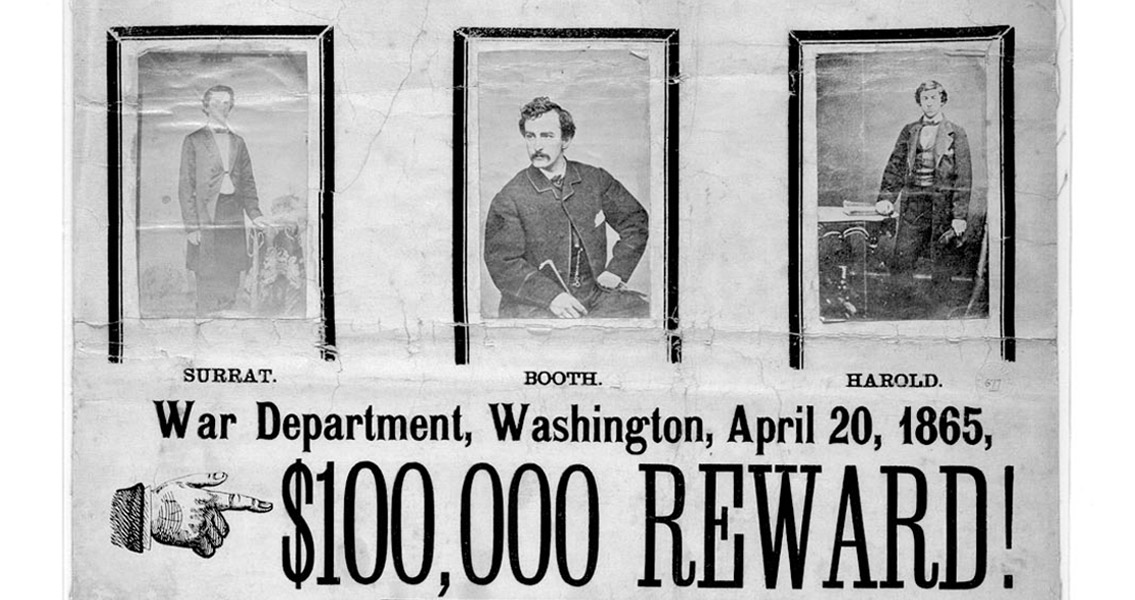<![CDATA[151 years ago John Wilkes Booth became the first person to assassinate a US president when he shot Abraham Lincoln at Ford's Theatre in Washington. Like the assassination of President Kennedy 98 years later, the event almost immediately kick started a series of conspiracy theories that continue to be discussed and debated to this day. Lincoln's death came just five days after the surrender of Confederate General Robert E. Lee at Appomattox Court House, Virginia, an event which all but brought the US Civil War to a close. Nevertheless, as with much of his presidency, Lincoln's death was inextricably linked to the conflict which split the nation. Occupying a private box just above the stage, Lincoln, his wife Mary, a young army officer named Henry Rathbone and Rathbone’s fiancé, Clara Harris, the daughter of New York Senator Ira Harris, were attending a performance of acclaimed comedy, "Our American Cousin". Booth: an actor, Maryland native and Confederate sympathiser, who had remained in the North during the Civil War, snuck into Lincoln's box at 10:15 and shot the president in the back of the head. Booth stabbed Rathbone in the shoulder when he tried to apprehend him, then jumped from the box onto the stage. Booth broke his leg in the fall, yet still escaped from the theatre and Washington itself. Lincoln, paralysed and struggling to breathe, was rushed from the theatre and taken to a house across the street. The surgeon general concluded that Lincoln could not be saved. The president died at 7:22 am the following morning. The nation entered a state of mourning while Union soldiers launched a pursuit of Booth and one of his accomplices, David Harold. The pair headed south towards Maryland, making their way through forest land and only stopping to have Booth's leg reset by Dr. Samuel Mudd. On 26th April, the Virginia farmhouse where Booth and Harold were staying was surrounded by Union troops. After setting fire to the house had failed to drive the fugitives out, the troops opened fire, mortally wounding Booth with a shot to the neck. Four of Booth's accomplices would go on to be tried and executed, yet the man who actually killed Lincoln died before he could stand trial. This lack of a court appearance has undoubtedly added to the mystery surrounding the Lincoln assassination. It is generally believed that Lincoln's murder was the culmination of a plot by Booth and several other conspirators, a last ditch attempt to save the Confederate cause. On 20th March Booth and his accomplices had planned to kidnap Lincoln and drag him to the Confederate capital Richmond, but the mission was foiled by a sudden change in the president's plans. General Lee's surrender pushed Booth to desperation and he hoped to break the union by killing the president. The plan also aimed to kill Vice President Andrew Johnson and Secretary of State William H. Seward, two of Lincoln's potential successors, hoping that doing so would throw the whole Union into disarray. Seward was attacked in his own home on the night of the 14th, but he survived the assault. Conspiracy theories exist however, which have been published in the years since the dramatic event. One which immediately gathered attention was that Vice President Johnson had been involved in Lincoln's assassination. On the afternoon before the shooting Booth paid a visit to the hotel where Johnson was staying, finding the vice president wasn't there, he left a note, "Don’t wish to disturb you; are you at home?" The note quickly roused suspicion, and Mary Lincoln in particular held a strong belief Johnson was somehow involved, writing in a letter to a friend "“deeply impressed, with the harrowing thought, that [Johnson] had an understanding with the conspirators…Johnson, had some hand, in all this.” The suspicion went beyond the former first lady however, and Congress set up a special committee to investigate Johnson's role, which ultimately failed to find sufficient evidence. Other conspiracy theories claim that Lincoln was the victim of a much wider Confederate plan involving its own secret service. They claim that Booth acted after explosives expert Thomas F. Harney was captured on his way to blowing up the White House. Knowing Harvey's mission had failed, Booth was deployed as an alternative. Lincoln's death has also been tied in with the global banking system. One theory claims that Booth had connections with the Rothschild banking family, who believed Lincoln's protectionist policies would damage the British bank's prospects. Even disaffected Northerners have been accused of organising the Lincoln assassination, on the basis that Lincoln's Reconstruction policies were too mild, failing to exact a heavy enough price from the South for the Civil War. Such conspiracy theories have varying amounts of evidence to support them, yet their existence is informative in itself, the skepticism they represent highlighting that Lincoln's death is still considered to be an event of such historical significance it can't be explained by the actions of an actor and his accomplices. ]]>
Lincoln Assassinated, Conspiracy Theories Start
